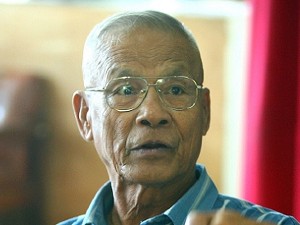MANILA, Philippines–China’s announcement that it would expel all foreign ships entering disputed areas in the South China Sea, including parts known as the West Philippine Sea, gives the Philippines more reason to seek a multilateral approach to resolve the problem, former Armed Forces Chief of Staff Gen. Rodolfo Biazon said on Friday.
Biazon, now chairman of the House committee on national defense, said China’s move was bound to affect the national interest of countries such as the United States and those in Europe, which all use the disputed waters for trade and commerce.
He urged President Benigno Aquino to convene the National Security Council “so we will have a uniform voice” on the issue.
“China’s move will definitely escalate the tension in the area,” he told the Inquirer in a phone interview.
Rep. Ben Evardone, chairman of the House committee on public information, described the move as “provocative,” saying it should be “dealt with the collective action” by the Association of Southeast Asian Nations, United Nations, and the US.
“Clearly, China is trying to bully the Philippines and other countries in the region,” he said. “The Asean, UN and the US should also initiate moves to preserve peace in the area to ensure navigational freedom in the West Philippine Sea.”
“The world economy will be adversely affected if China continues its provocative actions,” he added.
China’s state media earlier reported that its border patrol would begin accosting foreign vessels that would enter areas in the South China Sea, which are also claimed by other countries.
Biazon said the Department of Foreign Affairs should clarify the report directly with Beijing, and check if the order was made only by Hainan province.
In the meantime, he said the report should boost Manila’s decision to reject China’s position the dispute should be settled bilaterally with individual claimant countries.
“Indeed, the problem should not be limited within Asean. It should be tackled at the level of the UN and include the US,” he said.
“Note that not only entities in Asia will be affected. You also have countries from Europe, the Middle East, and Latin and North America, which all use the areas to be policed by China,” he added.
Biazon said the DFA should be clarified on what “particular activities” would be covered by China’s order to its border police.
“And how would the order affect the international principle of innocent passage?” he asked.


